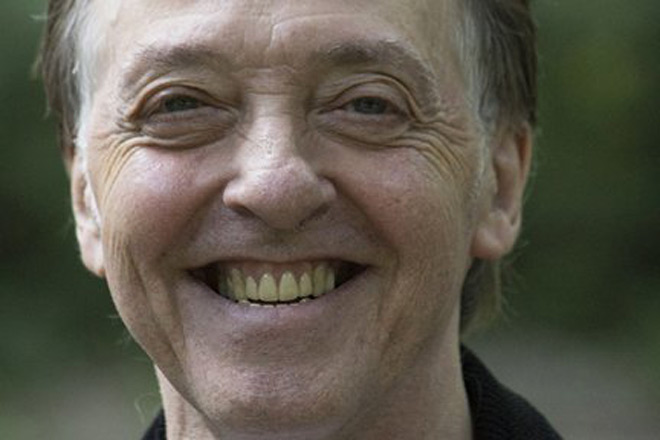
The story of a Rock-n-Roll band is never an even path. There are ups, downs, breakups, reunions, and sometimes tragedy. The nature of a life in music, these stories are what shape the history of Rock-n-Roll, and one of the more interesting comes in the form of Badfinger. A band which would become the first signed to The Beatles’ Apple label in 1968, Badfinger would go on to a string of success in the 1970s thanks to excellent songwriting, a distinctive sound, and the sum of all the parts in their most memorable lineup – Pete Ham, Mike Gibbins, Tom Evans, and Joey Molland.
Now, all these years later, the legacy of Badfinger lives on each time their songs are played on the radio or when Mr. Joey Molland performs the music of he and his mates live. Recently we sat down with the humble musician to talk about the life and times of Badfinger, the misconceptions surrounding their breakup, his upcoming tour, life lessons, plus much more.
CrypticRock.com – The story of Badfinger dates back nearly 6 decades. Attaining a great deal of success in the 1970s, the band is considered a very important part of Rock-n-Roll history. Through all the ups and downs, how would you describe your experience as a part of Badfinger?
Joey Molland – I guess I would describe it as a life. (Laughs) It was good! I enjoyed my time in the band, we have had some misfortunates and the benefits that come from success. It has really worked out for me, I only wish the guys were around to enjoy it. I enjoyed myself and I have managed to be a musician most of my life; it’s really good, it’s kind of a dream really.
CrypticRock.com – Having a chance to play music your entire life, and be successful, is fantastic. Your entrance into the band coincided with much of the band’s success in the ’70s. What were those recording sessions like for the band?
Joey Molland – They were great! It was a real band in the sense I joined in 1969, we started recording almost immediately. I had some previous experience writing songs for another band I had been in called The Rain; that introduced me to songwriting really. I had the opportunity to pursue that in the Badfinger band, and I’m thankful of course that they liked the songs. It was great for me to be working with Peter (Ham), Tommy (Evans), and Mike (Gibbins) on their songs – promptly playing guitar and playing a bit of piano even. It was a great experience! There were 5 albums with the original band; every time we went in it was a little bit new, a little bit more, we would like to think a little bit better. We were all working on our songs, it was a thing we did on a regular basis, that is what we did. All we did was gig, write, and go record, gig, write, and go record. We chose our own songs mainly; the band made the decisions on what songs we did. We played through them in the studios and worked them up into some form. The ones we really liked we would really pursue, a song like “Baby Blue,” “Suitcase,” and “Better Days,” speaking about my own stuff.
It was a very enjoyable experience. The guys could sing anything, sing any harmony; we were really good at 3 and 4 part harmony. We had all done our Buddy Holly, Chuck Berry, Little Richard homework and Rock-n-Roll roots. All the way up to The Beatles, we were constantly learning and constantly trying to be better musicians. We were always nervous about the music, we were always nervous about the band. We really worked hard! We never looked at ourselves as some kind of super band, even after we had the success. People were saying things like we were The Beatles and all this. We never really got into that trip, we were all working musicians. We worked on what we did, we worked hard on what we did, and we did our very best. All those things, and the appreciation of the audience of course, a lot of journalists would say very nice things about us; all of those things, we really appreciated. It was a great thing to do, we felt really fortunate for the opportunities that came our way, they were remarkable.
Getting to play with John Lennon, getting to play with George Harrison, doing things like the Bangladesh concert. It was all a mind-expanding experience for us. We wrote songs about that experience and about our lives in general. We tried to be honest in the songs and be straightforward with what they were. We were always jealous of other bands, we had that kind of paranoia. Everybody does that I think when you start getting successful, you start being compared to great bands. You see those great bands, some stunning artists. Overall, the experience was incredible.
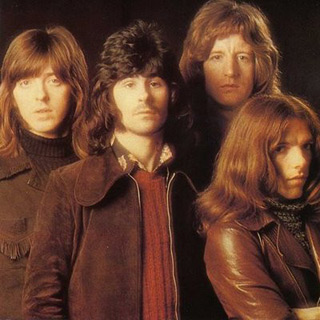

CrypticRock.com – It really sounds like it was amazing, and a lot of great music came out of Badfinger. It really was a collaborative effort; you look at those albums, you can see everyone contributed to the songs.
Joey Molland – Yeah, we did! We really got behind each other. When we would work on a song, any particular song, we would work on to back that singer up, back the guy up and put the bits in that we could come up with. We all seemed to like the way each other played. Although Pete and I played completely different kinds of guitar, we seemed to gel really well when it came to parts. What I could do behind his singing and his melody lines, and what he could do behind my singing and my melody lines, it was a cooperative effort.
Pete used to work with Mike Gibbins. He really brought Mike along as a songwriter, because Mike wasn’t really a guitar player; he tinkered on the piano and such and he played left handed. We actually drew him out a chord book on one of the bus tours so he could exercise. We did work with each other a lot, we had a great love for each other. We had great fun, we all had our personalities of course, but we had a great love for each other.
I sound like I am shining it up, but it is just a fact of the matter. The reason we ended up breaking up was because of managers, not because the band wanted to break up. The reason all the bad things came about – and they did, and they do raise their head in the Badfinger story – all of that came from the management side of it, not from inside the band.
CrypticRock.com – Understood. That is the case with a lot of bands unfortunately. There are always misconceptions of why bands break up and how things happened. It happens often.
Joey Molland – It does. You start getting successful, big people start coming around and they want a bit. The people in the band start to get pulled apart by people. I never wanted to leave the band: I did because of the managers, I couldn’t see any future. It is just really horrible. I agree with you, managers and the outside people are partially responsible for most bands breaking up. It is sad because a band, a particular band, is a group of particular people that make a particular thing happen, you can’t replicate that. That is why since Tommy and I worked together in the old days, Elektra/Asylum wanted to call the band Badfinger. It was never our intent to call the band Badfinger, that is why I have never really made another Badfinger record. How can I make a Badfinger record without those 3 guys? You can’t do it, you just can’t. It’s a damn shame because the bands that make it are generally pretty good and they have done a lot to get where they are. They have experienced and grown together: at that particular point it becomes right, then all of a sudden you have success. I can’t say for definite, but I think that our band, Badfinger, would probably still be making records if it wasn’t for those weird things happening.
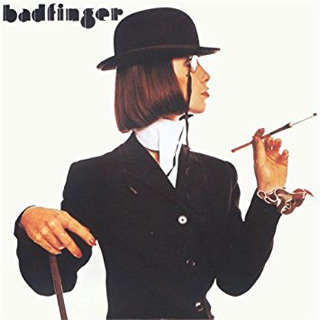
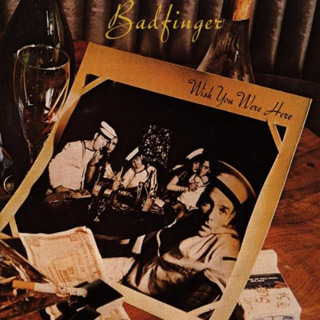
CrypticRock.com – That would have been wonderful to see. The legacy of Badfinger lives on with you: you tour and you are set to perform some shows coming up, playing the entire 1971 Badfinger album Straight Up.
Joey Molland – Yeah, that’s right. We are involved with a promoter out in California who came to me with the idea. He put a young band together, New York musicians actually but they all live in Los Angeles. Four guys, excellent players, great tenor voices, youthful energy who are in their mid to late 20s, perhaps a little older than that. They sing like birds and love the music, you can feel it in the playing. We have had great success playing the Straight Up album. We also do some of the other deeper tracks from some of the other Badfinger records. We do the other singles of course; it’s really a good show and I really enjoy it.
I have a jam band that I play with as well. In the old days, the Badfinger band turned into a head Rock band on stage. For years I have been playing that kind of show, jamming but still doing the hits of course, but as they are, we don’t screw around with that stuff. Doing songs like “Suitcase,” we get a bit of a jam in it. Musically that is what we did in the old days. In the original band, “We’re for the Dark” lasted 7 or 8 minutes. It was a different realm back then, but now I do the same thing with Joey Molland’s Badfinger when I go out and do live concerts. We played City Winery in NYC last time we came around, last October. Great night, we sold it out. People really enjoy it, it’s good.
CrypticRock.com – Yes, and you will be back to City Winery in NYC on April 10th. It will be exciting to see you come back with this new show.
Joey Molland – We will have a good night, it is lovely there. I think we will do a few different songs for people who came to the last one. We will vary it up a little bit but we will do the entire Straight Up album, which happens to be Badfinger’s popular record. It’s a great buzz for me to do the other songs as well. Things like “Name of the Game,” “Perfection,” “Sometimes,” “I’d Die Babe,” stuff like that. It is just a blast!
CrypticRock.com – It will be a great show! Rightfully so, you said it would not be right to make another Badfinger record without the other members. That said, you have released a list of solo albums through the years, including 2013’s Return to Memphis. Will you perhaps mix in some of that for these shows?
Joey Molland – We might, I am not sure which. (Laughs) I tend to do a lot more of that in my Joey Molland’s Badfinger show; I don’t use the Badfinger concerts to promote Joey Molland songs. It kind of feels a bit weird for me. Does that make sense?

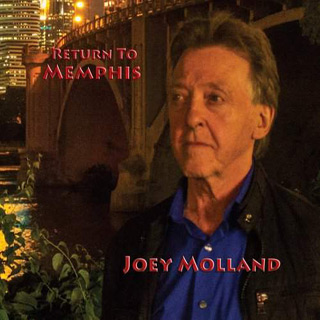
CrypticRock.com – It makes perfect sense. It is commendable that you try and keep the two things unique to one another.
Joey Molland – We might do a song like “Walk out in the Rain.” In the Straight Up show, we will do some things that were never put on Badfinger records. We do stuff like “Getaway,” but I really don’t do a lot of the Joey Molland solo stuff in this particular show.
CrypticRock.com – Understandable. It will be great to see these shows as they make their way across the U.S. Perhaps next go around we can hear more Joey Molland solo material too, because it is quite good.
Joey Molland – I appreciate you saying that! I do play my songs, I don’t play them all, and don’t play lots of them. I am also getting old, so I don’t do a lot of shows. I wish I could, but it’s just one of those things.
CrypticRock.com – Well, fans have these shows to look forward to. You have also collaborated with many other musicians through the years from John Lennon and George Harrison to members of 10,000 Maniacs. From all your experiences, what have you learned from working with others?
Joey Molland –
Different things from different people, of course. John Lombardo and everyone from 10,000 Maniacs, even though they play completely different music than what I have done most of my life, we are still the same. We all feel the same way about the music, no matter what the form is. I also found out how sweet they are, really nice people. I sang on one of John Lombardo’s albums years ago.
I still take things from people I worked with, George (Harrison) is an incredible example. The simple things he taught us with recording techniques, such as keep the acoustic part straight. Don’t throw songs away so easily, we did, if we couldn’t a couple of lines in a song lyric – go outside your mind for your lyrics, look in different places. George was a complete expert at that. Also, and I was surprised about this, George was concerned about the commerciality of a song, if it would get played on the radio. He edited some of our songs with that in mind.
John (Lennon) was very straight forward with us. I grew up in Liverpool: I went to the same music stores, I listened to all the same records, the same radio stations, and went to the same Rock clubs that those guys went to when they were kids. I developed the same habits because I was raised in Liverpool, it is a particular place like New York. I had the same upbringing as those guys, Tommy of Badfinger was the same. It gave us the ability I think to understand when John or George played us a song, we’d know where they were going. We knew the form it was going to be and we knew how it would have an introduction, verse, a refrain, a chorus, and a bridge. I think it gave us an ability to grasp their songs quickly and not put our own two senses into it, they certainly didn’t need it. (Laughs)
John was very straightforward, when he played us “Jealous Guy,” he just sat on his stool, we put the headphones on, and he sang it to us. It was difficult to learn it was John Lennon sitting on a stool singing a song, it is very difficult to get over that. George was the same: he came in and he told us to keep the acoustic part straight, don’t get too carried away, just play the ups and down strokes, nice and even. We have done that, I have done it ever since! I have told thousands of musicians this: just play that acoustic straight and it never fails; it stops from the backtrack getting messy, the rhythm of the song gets stronger, it just works.
There were great songs George would come over with and his songs were pretty complicated, the chord sequences in them. It would take a couple of times to get a hold of it, but once we had it, we were all set. That is why he brought us to Bangladesh to do that live show. Once we ran through and had the songs together, we were good. Imagine going to John Lennon’s house and knocking around there for 3 or 4 hours, and then John coming in and just playing you new songs. (Laughs) It’s really extraordinary.


CrypticRock.com – Wow, those are some really amazing memories to have. You mentioned you feel in your heart Badfinger would have continued if things did not happen how they did. That said, do you believe if John had not been tragically killed, among other things that happened, would The Beatles have gotten back together?
Joey Molland – I think they would have. They were already doing it with 2 or 3 of them playing together. How could they not? I would think it would happen automatically. We used to have a drummer in Joey Molland’s Badfinger called John Richardson, he has since played with Gin Blossoms and all these other people. We do sessions together. If we do sessions, although our paths don’t cross all the time, I am sure those guys could play with each other.
Look at the job they did in the Anthology show and they did the John Lennon song “Free as a Bird,” which I thought was absolutely fantastic. Just tracking on the bridge Paul wrote, it was amazing. I can imagine them doing it again, I don’t know if they would have gone in the studio and done the work like they had done as The Beatles. That was kind of a different world, wasn’t it? They would go in the studio and work on songs. They would go in the studio all day and work an arrangement just to see if a song worked. I don’t know if they would have done that kind of reunion, but I could see how they might go record a song. Just as mates, just as pals. With all the money in the world they could do whatever they wanted. If they had the thought, why not!


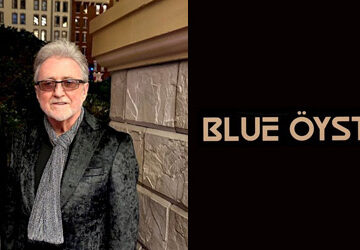
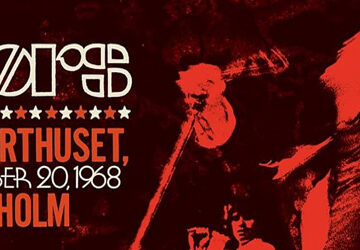
No comment